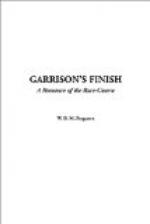Garrison considered. “No—no,” he said at length. “No, if—if by any chance I am his nephew—you see how I want to believe you, Jimmie, God knows how much—then I’ll tell him afterward. Afterward when—I’m clean. I want to lie low; to square myself in my own sight and man’s. I want to make another name for myself, Jimmie. I want to start all over and shame no man. If by any chance I am William C. Dagget, then—then I want to be worthy of that name. And I owe everything to Garrison. I’m going to clean that name. It meant something once—and it’ll mean something again.”
“I believe you, kid.”
Subsequently, Drake fulfilled his word concerning the “rustling round” after that eminent lawyer, Theobald D. Snark. His efforts met with failure. Probably the eminent lawyer’s business had increased so enormously that he had been compelled to vacate the niche he held in the Nassau Street bookcase. But Drake had not given up the fight.
Meanwhile Garrison had commenced his life of regeneration at the turfman’s Long Island stable. He was to ride Speedaway in the coming Carter Handicap. The event that had seen him go down, down to oblivion one year ago might herald the reascendency of his star. He had vowed it would. And so in grim silence he prepared for his farewell appearance in that great seriocomic tragedy of life called “Making Good.”
CHAPTER XIV.
Garrison finds himself.
Sue never rightly remembered how the two months passed; the two months succeeding that hideous night when in paralyzed silence she watched Garrison away. The greatest sorrow is stagnant, not active. The heart becomes like a frozen morass. Sometimes memory slips through the crust, only to sink in the grim “slough of despond.”
Waterbury’s death had unnerved her, coming as it did at a time when tragedy had opened the pores of her heart. He had been conscious for a few minutes before the messenger of a new life summoned him into the great beyond. He used the few minutes well. If we all lived with the thought that the next hour would be our last, the world would be peopled with angels—and hypocrites.
Waterbury asked permission of his host, Colonel Desha, to see Sue alone. It was willingly granted. The girl, white-faced, came and sat by the bed in the room of many shadows; the room where death was tapping, tapping on the door. She had said nothing to her father regarding the events preceding the runaway and Waterbury’s accident.
Waterbury eyed her long and gravely. The heat of his great passion had melted the baser metal of his nature. What original alloy of gold he possessed had but emerged refined. His fingers, formerly pudgy, well-fed, had suddenly become skeletons of themselves. They were picking at the coverlet.
“I lied about—about Garrison,” he whispered, forcing life to his mouth, his eyes never leaving the girl’s. “I lied. He was square—” Breath would not come. “For-forgive,” he cried, suddenly in a smother of sweat. “Forgive—”




